GWM ORA 03 vs Jeep Avenger – Performance, range & efficiency compared
Everyday use, family trips or long-distance drives – here’s where the differences show.
Discover whether GWM ORA 03 or Jeep Avenger fits your lifestyle better.
Costs and Efficiency: When it comes to price and running costs, the biggest differences usually appear. This is often where you see which car fits your budget better in the long run.
Jeep Avenger has a significantly advantage in terms of price – it starts at 21900 £, while the GWM ORA 03 costs 33400 £. That’s a price difference of around 11478 £.
In terms of energy consumption, the advantage goes to the Jeep Avenger: with 15.50 kWh per 100 km, it’s slight more efficient than the GWM ORA 03 with 16.50 kWh. That’s a difference of about 1 kWh.
As for range, the GWM ORA 03 performs barely noticeable better – achieving up to 420 km, about 20 km more than the Jeep Avenger.
Engine and Performance: Power, torque and acceleration are the classic benchmarks for car enthusiasts – and here, some clear differences start to show.
When it comes to engine power, the GWM ORA 03 has a slight edge – offering 171 HP compared to 156 HP. That’s roughly 15 HP more horsepower.
In acceleration from 0 to 100 km/h, the GWM ORA 03 is slight quicker – completing the sprint in 8.20 s, while the Jeep Avenger takes 9 s. That’s about 0.80 s faster.
In terms of top speed, the Jeep Avenger performs slightly better – reaching 194 km/h, while the GWM ORA 03 tops out at 160 km/h. The difference is around 34 km/h.
There’s also a difference in torque: Jeep Avenger pulls hardly perceptible stronger with 260 Nm compared to 250 Nm. That’s about 10 Nm difference.
Space and Everyday Use: Cabin size, boot volume and payload all play a role in everyday practicality. Here, comfort and flexibility make the difference.
Both vehicles offer seating for 5 people.
In curb weight, Jeep Avenger is clearly perceptible lighter – 1180 kg compared to 1615 kg. The difference is around 435 kg.
In terms of boot space, the Jeep Avenger offers clearly perceptible more room – 380 L compared to 228 L. That’s a difference of about 152 L.
In maximum load capacity, the Jeep Avenger performs distinct better – up to 1277 L, which is about 419 L more than the GWM ORA 03.
When it comes to payload, Jeep Avenger distinct takes the win – 502 kg compared to 355 kg. That’s a difference of about 147 kg.
Who wins the race?
The Jeep Avenger proves to be dominates this comparison and therefore becomes our DriveDuel Champion!
Jeep Avenger is the better all-rounder in this comparison.
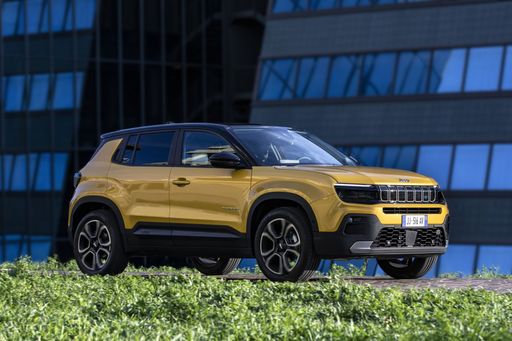
Jeep Avenger
GWM ORA 03
The GWM ORA 03 presents an intriguing fusion of retro design elements and modern technology, making it a standout in the current automotive landscape. Its distinctive aesthetic is matched by a surprisingly spacious interior, offering comfort and advanced infotainment features for a seamless driving experience. With a focus on sustainable mobility, this vehicle delivers impressive performance without compromising on efficiency, appealing to both environmentally conscious drivers and technology enthusiasts alike.
detailsJeep Avenger
The Jeep Avenger is a compact SUV that brings a blend of rugged design and modern technology, making it ideal for both urban and off-road adventures. Its robust build and distinctive styling capture Jeep's iconic spirit while offering a comfortable and refined driving experience. With advanced safety features and a versatile interior, the Avenger caters to a wide range of drivers looking for practicality and excitement.
details @ Stellantis
@ Stellantis
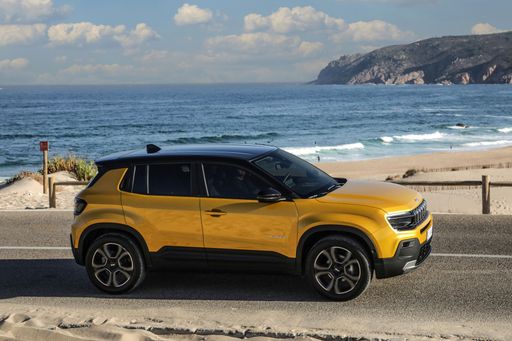 @ Stellantis
@ Stellantis
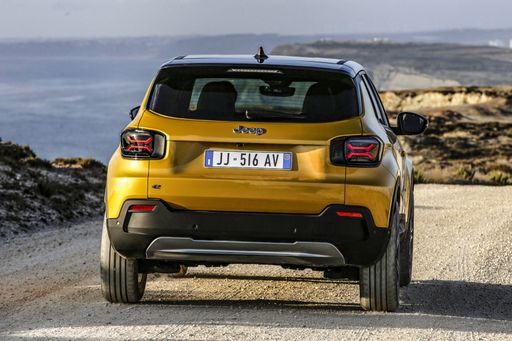 @ Stellantis
@ Stellantis
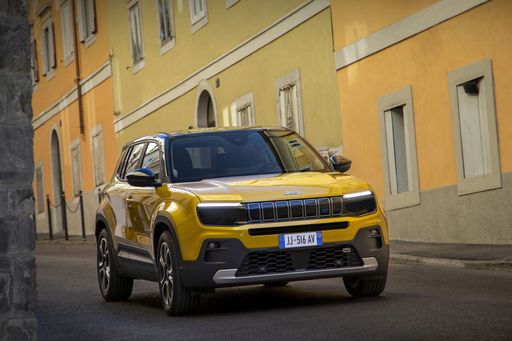 @ Stellantis
@ Stellantis
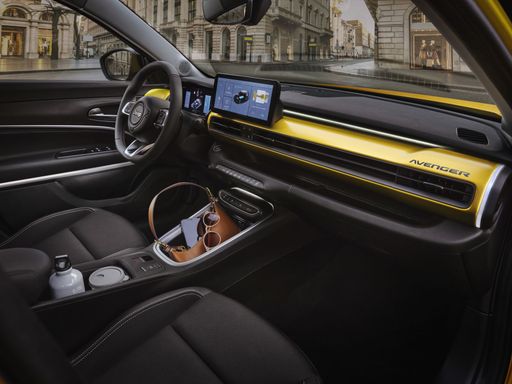 @ Stellantis
@ Stellantis

|
|
|
|
|
Costs and Consumption |
|
|---|---|
|
Price
33400 - 42400 £
|
Price
21900 - 36900 £
|
|
Consumption L/100km
-
|
Consumption L/100km
4.9 - 5.7 L
|
|
Consumption kWh/100km
16.5 - 16.8 kWh
|
Consumption kWh/100km
15.50 kWh
|
|
Electric Range
310 - 420 km
|
Electric Range
400 km
|
|
Battery Capacity
45.4 - 59.3 kWh
|
Battery Capacity
51 kWh
|
|
co2
0 g/km
|
co2
0 - 129 g/km
|
|
Fuel tank capacity
-
|
Fuel tank capacity
44 L
|
Dimensions and Body |
|
|---|---|
|
Body Type
Hatchback
|
Body Type
SUV
|
|
Seats
5
|
Seats
5
|
|
Doors
5
|
Doors
5
|
|
Curb weight
1615 - 1655 kg
|
Curb weight
1180 - 1520 kg
|
|
Trunk capacity
228 L
|
Trunk capacity
325 - 380 L
|
|
Length
4235 - 4254 mm
|
Length
4084 - 4088 mm
|
|
Width
1825 - 1848 mm
|
Width
1776 mm
|
|
Height
1603 mm
|
Height
1527 - 1541 mm
|
|
Max trunk capacity
858 L
|
Max trunk capacity
1218 - 1277 L
|
|
Payload
315 - 355 kg
|
Payload
494 - 502 kg
|
Engine and Performance |
|
|---|---|
|
Engine Type
Electric
|
Engine Type
Electric, Petrol, Petrol MHEV
|
|
Transmission
Automatic
|
Transmission
Automatic, Manuel
|
|
Transmission Detail
Reduction Gearbox
|
Transmission Detail
Reduction Gearbox, Manual Gearbox, Dual-Clutch Automatic
|
|
Drive Type
Front-Wheel Drive
|
Drive Type
Front-Wheel Drive, All-Wheel Drive
|
|
Power HP
171 HP
|
Power HP
100 - 156 HP
|
|
Acceleration 0-100km/h
8.2 - 8.3 s
|
Acceleration 0-100km/h
9 - 10.6 s
|
|
Max Speed
160 km/h
|
Max Speed
150 - 194 km/h
|
|
Torque
250 Nm
|
Torque
205 - 260 Nm
|
|
Number of Cylinders
-
|
Number of Cylinders
3
|
|
Power kW
126 kW
|
Power kW
74 - 115 kW
|
|
Engine capacity
-
|
Engine capacity
1199 cm3
|
General |
|
|---|---|
|
Model Year
2024
|
Model Year
2023 - 2025
|
|
CO2 Efficiency Class
A
|
CO2 Efficiency Class
A, D, C
|
|
Brand
GWM
|
Brand
Jeep
|
What drivetrain options does the GWM ORA 03 have?
Available configurations include Front-Wheel Drive.
The prices and data displayed are estimates based on German list prices and may vary by country. This information is not legally binding.
